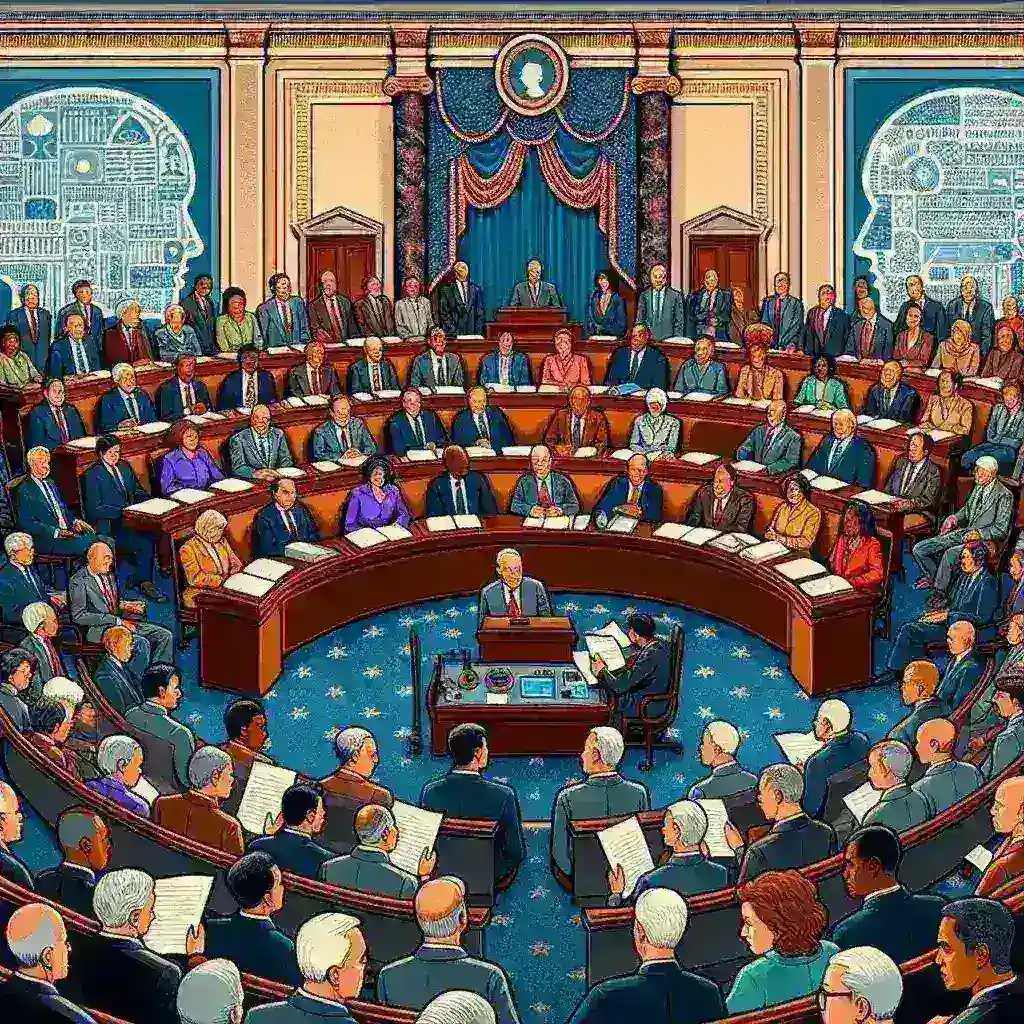The Looming Senate Vote: A Potential Turning Point in AI Regulation
The United States Senate is bracing for a pivotal vote on a Republican-backed proposal that seeks to institute a moratorium on state-level artificial intelligence (AI) regulations. This move, viewed by some as a necessary check on potentially conflicting and overly restrictive state laws, is generating significant debate and uncertainty within the tech industry and broader political landscape. This article delves into the intricacies of this proposed legislation, examining its potential impact on AI innovation, economic competitiveness, and the overall regulatory framework governing this rapidly evolving technology.
The GOP’s Rationale: A Unified Front Against Fragmentation?
Proponents of the bill, primarily within the Republican Party, argue that a patchwork of disparate state regulations threatens to stifle innovation and create an uneven playing field for businesses operating in the AI sector. They contend that a federal approach is essential to establish clear, consistent guidelines that foster a thriving AI ecosystem while mitigating potential risks. The argument centers on the belief that a national framework will prevent a chaotic scenario where companies face a myriad of conflicting requirements across different states, leading to increased compliance costs and slowing down technological advancements. This narrative is presented as a pro-business stance, aiming to protect American competitiveness in the global AI market.
Concerns and Counterarguments: A Chorus of Dissent
However, this proposal faces considerable opposition. Critics, including many Democrats and consumer advocacy groups, argue that a federal pause on state-level regulations could allow potentially harmful AI technologies to proliferate without adequate oversight. They highlight the importance of states acting as regulatory laboratories, experimenting with different approaches to AI governance and identifying best practices that could inform future federal legislation. The concern is that a federal moratorium could preempt crucial state-level protections related to data privacy, algorithmic bias, and consumer safety, issues that are seen as too important to be left solely to the federal government’s discretion. The counter-narrative emphasizes consumer protection and ethical considerations above pure economic growth.
The Current Landscape: A Patchwork of State Initiatives
Several states have already introduced or passed legislation related to AI, reflecting a growing awareness of the need to regulate this powerful technology. These initiatives range from data privacy regulations to requirements for algorithmic transparency and accountability. This diversity of approaches underscores the challenge of creating a unified national framework. Some states are taking a more cautious, restrictive approach, while others are adopting a more permissive stance. This divergence highlights the complexities involved in balancing innovation and risk mitigation, with each state prioritizing different aspects based on their unique economic and social contexts. This variation itself is cited by some as a reason for a temporary freeze to allow for more cohesive federal legislation.
Economic Implications: A Balancing Act
The economic implications of this proposed moratorium are far-reaching. A pause on state regulations could potentially reduce compliance costs for businesses, thereby fostering innovation and attracting investment in the AI sector. However, it could also lead to a relaxation of consumer protections and a widening of existing inequalities. The debate revolves around weighing the potential benefits of a simplified regulatory environment against the risks of unchecked technological development. Economists are divided, with some predicting a surge in innovation under a federal framework and others warning of potential negative consequences for consumer welfare and fair competition.
Ethical Considerations: Navigating the Moral Maze
Beyond the economic aspects, the ethical implications are equally significant. AI technologies raise complex moral questions concerning bias, transparency, accountability, and the potential for misuse. A federal pause on state regulations could potentially hinder the development of robust ethical guidelines, leaving these crucial issues largely unaddressed. The debate centers on whether a national approach is better equipped to address the ethical challenges posed by AI or whether a more decentralized, state-by-state approach allows for a more nuanced and responsive regulatory framework. This ethical dimension is arguably the most critical aspect of the ongoing discussion.
Historical Context: Lessons from Past Regulatory Battles
The current debate over AI regulation echoes past struggles to regulate emerging technologies. The history of internet regulation, for example, provides valuable lessons regarding the challenges of balancing innovation and consumer protection. Early efforts to regulate the internet were often fragmented and ineffective, leading to calls for a more unified approach. However, even a unified approach can face unexpected challenges, as seen with the ongoing debates surrounding data privacy and cybersecurity. Understanding these historical parallels can help inform the current discussion about AI regulation, highlighting the need for careful consideration of both short-term and long-term consequences.
Future Predictions: Navigating Uncertainty
Predicting the outcome of the Senate vote and the long-term impact of the proposed moratorium is difficult. If the bill passes, it could lead to a period of relative regulatory calm, allowing the federal government to develop a comprehensive national framework for AI governance. However, it could also create a vacuum of regulation, potentially enabling the development and deployment of harmful AI technologies. If the bill fails, on the other hand, the patchwork of state regulations could persist, potentially creating challenges for businesses operating across multiple states. Experts are divided, with scenarios ranging from a streamlined federal regulatory pathway to a protracted period of uncertainty and legal battles.
International Comparisons: Learning from Global Peers
Examining how other countries are regulating AI offers valuable insights and potential lessons for the United States. The European Union, for example, has adopted a comprehensive approach to AI regulation, emphasizing ethical considerations and data privacy. China, meanwhile, has taken a more centralized and interventionist approach, prioritizing national security and economic competitiveness. Comparing these different approaches can help inform the development of a more effective and appropriate regulatory framework for the United States, highlighting the need for a nuanced understanding of the global landscape.
Step-by-Step Analysis of the Proposed Bill
While the specifics of the bill may vary, a typical proposed moratorium would likely involve a temporary freeze on new state-level AI regulations, allowing time for federal agencies to study and develop a comprehensive national strategy. This process would likely involve extensive stakeholder consultation, including input from industry experts, consumer advocates, and policymakers. The ultimate goal would be to establish a balanced framework that promotes AI innovation while addressing potential risks to consumers, businesses, and society as a whole. A step-by-step examination of a specific bill’s language could reveal further details and nuances.
Real-World Examples: Illustrating the Stakes
The impact of AI is already being felt across numerous sectors, from healthcare to finance to transportation. Real-world examples of AI applications, both beneficial and harmful, can vividly illustrate the stakes involved in this debate. For example, the use of AI in healthcare can improve diagnostics and treatment, but it can also raise concerns about patient privacy and algorithmic bias. Similarly, the use of AI in autonomous vehicles offers the potential for increased safety and efficiency, but it also poses risks related to accidents and liability. These examples highlight the need for careful regulation to maximize the benefits while mitigating the risks.
Quotes from Experts: Diverse Perspectives
The debate over AI regulation has attracted the attention of numerous experts from diverse backgrounds. Quotes from leading academics, industry leaders, and policymakers can shed light on the complexities and nuances of this issue. These quotes can help to paint a clearer picture of the various perspectives and arguments surrounding the proposed moratorium, highlighting the diversity of opinions within the tech community and the political arena. Including these diverse perspectives is key to understanding the nuances of the debate.
Conclusion: A Critical Juncture
The Senate vote on the GOP-led bid to pause state AI regulations represents a critical juncture in the ongoing debate over how to govern this transformative technology. The outcome will have significant implications for the future of AI innovation, economic competitiveness, and the broader societal impact of AI systems. The need for a balanced approach, one that fosters innovation while addressing ethical and societal concerns, is paramount. The path forward will require careful consideration of various perspectives, a deep understanding of the technological landscape, and a commitment to creating a regulatory framework that serves the best interests of all stakeholders.
It is crucial to follow the developments closely, as this vote will undoubtedly shape the future of AI regulation in the United States and potentially influence similar debates worldwide. Further research and analysis will be needed to fully assess the long-term consequences of this decision. The coming months and years will be critical in determining the trajectory of AI development and governance in the years to come.
For more information on AI regulation, you can refer to resources such as the Congressional Record and the Federal Trade Commission website.

